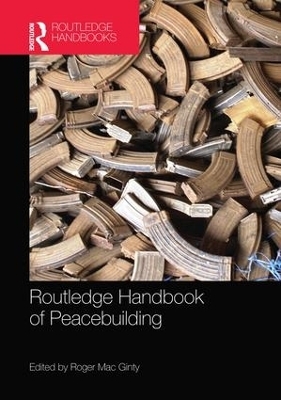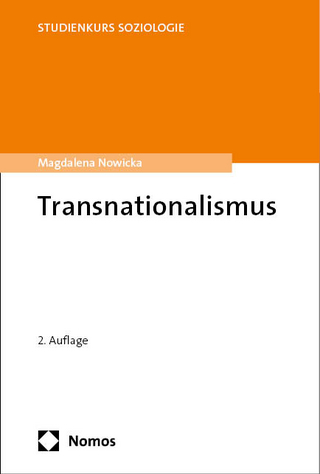
Routledge Handbook of Peacebuilding
Routledge (Verlag)
978-1-138-92270-9 (ISBN)
This new Routledge Handbook offers a comprehensive, state-of-the-art overview of the meanings and uses of the term ‘peacebuilding’, and presents cutting-edge debates on the practices conducted in the name of peacebuilding.
The term ‘peacebuilding’ has had remarkable staying power. Other terms, such as ‘conflict resolution’ have waned in popularity, while the acceptance and use of the term ‘peacebuilding’ has grown to the extent that it is the hegemonic and over-arching term for many forms of mediation, reconciliation and strategies to induce peace. Despite this, however, it is rarely defined and often used to mean different things to different audiences.
Routledge Handbook of Peacebuilding aims to be a one-stop comprehensive resource on the literature and practices of contemporary peacebuilding. The book is organised into six key sections:
Section 1: Reading peacebuilding
Section 2: Approaches and cross-cutting themes
Section 3: Disciplinary approaches to peacebuilding
Section 4: Violence and security
Section 5: Everyday living and peacebuilding
Section 6: The infrastructure of peacebuilding
This new Handbook will be essential reading for students of peacebuilding, mediation and post-conflict reconstruction, and of great interest to students of statebuilding, intervention, civil wars, conflict resolution, war and conflict studies and IR in general.
Roger Mac Ginty is Professor of Peace and Conflict Studies at the Humanitarian and Conflict Response Institute and the Department of Politics at the University of Manchester. He edits the journal Peacebuilding and his latest book was International Peacebuilding and Local Resistance: Hybrid forms of peace.
Introduction, Roger Mac Ginty Section 1: Reading Peacebuilding 1. Problem-Solving and Critical Paradigms, Michael Pugh 2. The Evolution of Peacebuilding, Stephen Ryan 3. The Limits of Peacebuilding Theory, Gerald Steinberg Section 2: Approaches and Cross-Cutting Themes 4.Gender, Maria O’Reilly 5. Religion and Peacebuilding, Mohammed Abu-Nimer 6. Reconciliation, Emma Hutchison and Roland Bleiker 7. The Politics of Memory and Peacebuilding, Marc Howard Ross Section 3: Disciplinary Approaches to Peacebuilding 8. International Relations Theory and Peacebuilding, Dominik Zaum 9. Social Psychology and Peacebuilding, Shelley McKeown 10. Social Anthropology and Peacebuilding, Anne M. Brown 11. Economists and Peacebuilding, Jurgen Brauer and Raul Caruso 12. Sociology and Peacebuilding, John Brewer 13. History and Peacebuilding, Anthony Oberschall 14. Quantitative Approaches, Patrick M. Regan Section 4: Violence and Security 15. The Securitisation of Peacebuilding, Necla Tschergi 16. Security Sector Reform, Mark Sedra 17. Disarmament, Demobilization and Reintegration, Alpaslan Özerdem 18. Zones of Peace, Landon E. Hancock 19. Peacebuilding, Law and Human Rights, Christine Bell Section 5: Everyday Living and Peacebuilding 20. Employment and Household Welfare, Patrícia Justino and Ricardo Santos 21. Organic versus Strategic Approaches to Peacebuilding, Sherrill Stroschein 22. Education and Learning, Patricia A. Maulden 23. Youth, Siobhan McEvoy-Levy Section 6: The Infrastructure of Peacebuilding 24. The International Architecture of Peacebuilding, Edward Newman 25. The Political Economy of Peacebuilding and International Aid, Susan L. Woodward 26. Statebuilding, Susanna Campbell and Jenny H Peterson 27. Civil Society, Thania Paffenholz 28. Indigenous Approaches to Peacebuilding, Anthony Wanis-St. John 29. Urban Planning and Policy, Scott A. Bollens Conclusion, Roger Mac Ginty
| Erscheint lt. Verlag | 9.6.2015 |
|---|---|
| Zusatzinfo | 1 Tables, black and white; 4 Line drawings, black and white |
| Verlagsort | London |
| Sprache | englisch |
| Maße | 174 x 246 mm |
| Gewicht | 820 g |
| Themenwelt | Sozialwissenschaften ► Politik / Verwaltung ► Europäische / Internationale Politik |
| Sozialwissenschaften ► Politik / Verwaltung ► Staat / Verwaltung | |
| ISBN-10 | 1-138-92270-6 / 1138922706 |
| ISBN-13 | 978-1-138-92270-9 / 9781138922709 |
| Zustand | Neuware |
| Haben Sie eine Frage zum Produkt? |
aus dem Bereich


